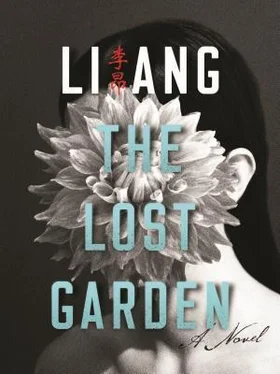Yinghong was too young to know what it meant to be pretty; her understanding of the concept came mostly from mirrors.
In those days, mirrors were mostly oval-shaped, about two feet from top to bottom, with a mercury surface and a support base made of thick coiled wire. As a child, Yinghong did not like to look at herself in a mirror; what attracted her were the colorful photographs of movie stars adhered to the back, popular icons and what the people called beauties such as Asaoka Ruriko, Wakao Fumiko, and Mitsumoto Fujiko.
They were always smiling, revealing slightly crooked front teeth, a common trait among Japanese women. There were usually one or two exposed small canines as well; their uneven teeth added a childlike quality to their faces. Before technology for color printing was perfected, the colors would sometimes be slightly off, shifting the red for the lips to below the mouth, thus adding a second pair of red lips beneath white teeth, while the face remained smiling. Or the eyeliner would be printed to one side, as if the subject had double eyes. In any case, you could still see the double folds of the eyes, the long thin brows, the high nose, and tiny mouth, all in all, the perfect picture of a beauty.
Her mother was a beauty like that, with well-proportioned features, a nose with a straight and high bridge, eyes that were not too big beneath deep and long double-folded lids that slanted slightly upward at the corners. Her brows were long and nicely arched, like crescent moons, with modest shadows. Downy hair grew around the edges of her brows, making them especially graceful and alluring. Her mouth was small, but her lips were fleshy, a perfect match for the preferred solid yet gentle look of the time.
Yinghong had kept an enlarged photo of her mother in middle age. A black-and-white photo, taken by her father, of course, it was a foot high, and hand-colored, a substitute before color photo was invented. Vermillion lips, black eyes and brows; all clearly marked. Her hair, in tiny curls combed back to the sides, gave her a bewitching look. Father had added pink to her cheeks to represent rouge, while the smudges of blue and green were eye shadow, which he had copied from photos of movies stars.
Many years later, when she rushed back from America to Lotus Garden for Father’s funeral, Mother’s face looked just like that hand-colored, but faded photo; her features remained the same, just suddenly decades older.
After the funeral, Yinghong’s two brothers had to leave the country immediately, for their visas to Taiwan, obtained through special channels, would not permit them to stay long. They had to leave before the postfuneral seven-day rites were performed.
On the night before they left Lotus Garden, Mother took an old account book out of a drawer of a craftsman’s desk from an upstairs room in Lotus Tower. It had been put away with care, but still looked tattered; the original cobalt blue cover had faded to a dark gray. Her mother’s graceful handwriting in ink, recording in Japanese the dates and places of transactions of every piece of family property, graced the red-lined cotton paper.
“Your father was not a spendthrift even in his youth,” Mother began slowly in Japanese, obviously prepared for this conversation.
“In high school, young men his age from wealthy families began to frequent the red-light district, on the pretext that they were there to compose poetry, an elegant act of social life. But your father never had any of the bad habits that commonly afflicted the wealthy young, nor did he consider such degenerate behavior the norm.”
Mother looked far and deep into the distance.
“When I married into the Zhu family, your father had just returned from travels in Europe after finishing his studies in Japan; he took over the Zhu family business, while devoting himself to perfecting the first modern high school, which the Zhu family had established, with the intention of promoting cultural activities and waking up the Taiwanese to resist foreign rule. Then the incident occurred.”
Mother paused briefly, highlighting the sound of the late-autumn gale howling in Lotus Garden. Cold wind seeped in through the latticed windows, gently tousling her gray hair.
She was sitting up straight on a purple sandalwood armchair in the small second-floor parlor. A tall woman, she maintained the usual pose of holding her body away from the back of the chair and placing her feet close together on the octagonal floor tiles. She was wearing a black two-piece dress, a jacket with old-fashioned upturned collars, and a skirt that fell below her knees. Yinghong had never seen her mother in a qipao or Taiwanese-style pantsuit. In her memory, that black dress came with a hat in the same color, but Mother was not wearing it that night.
“I thought I’d never see your father again, but he returned. Even though he was more or less a prisoner in Lotus Garden, at least he was back home.” Mother took a deep breath. “After the incident, I had to take over everything in the house. When he was in prison, everyone in the clan, convinced that he would never come out, wanted to divide up the family property. At the time, cutting off all ties with us was the best method for self-preservation, and I never begrudged them that.”
Her voice sounded neutral, far-reaching, as if narrating someone else’s story.
“As the first grandson of the first son, your father was given the most worthless and remote property, land that was only good for a garden, not suitable for farming. The good rice fields and houses in the city were all taken by your uncles. Except that no one could have predicted that a few years later, when the policy of Land to the Tillers was implemented, most of the dozens of jia of rice paddies they’d gotten would be appropriated. And us, we were not only able to keep our land, but it turned out to be in the heart of the city, when city planning began, new roads were paved, and new zoning laws were applied.”
The flicker of a serene smile flashed across Mother’s old, sallow face.
“It’s ironic when you think about it. The regime ruined your father’s life, but their policies, right or wrong, brought him new wealth.”
With a subtle gesture, she stopped her children from objecting to her interpretation of the turn of events.
“I came from a merchant’s family. Your maternal grandfather and uncles had foresight, and with their help, I learned to manage the land, property, and houses. I helped keep the family going on your father’s behalf so as not to add to his worries. And he could send you to study abroad when you were young. He was free to do what he wanted.”
Mother slowly stood up and turned to open a large, partioned armoire also made of purple sandalwood. Cameras and lenses filled all the spaces, ranging from early German models to recent ones from Japan, and all by renowned manufacturers.
“There are two hundred and thirty-two cameras in here. If you count the lenses alone, including those on cameras, there are two hundred and fifty-four.”
Yinghong nearly cried out in surprise at the sight of more than two hundred cameras, stored in an armoire that clearly had been made to Father’s specifications. The single piece of furniture took up a whole wall, and every space was crammed full with cameras and lenses. A coat of ash-white dust lay on the black metallic cameras. With so many types and models, they looked less like the cameras she was used to and more like ill-defined contraptions. Gathered in such numbers, they seemed to deconstruct the commonly accepted image of cameras, and had become strange and unrecognizable.
She went up to look for the Linhof she’d used, as well as Father’s favorite Leica M3 with its 50mm, 90mm, and 135mm lenses, but it was a fruitless attempt, as she found it impossible to tell one from another.
Читать дальше












